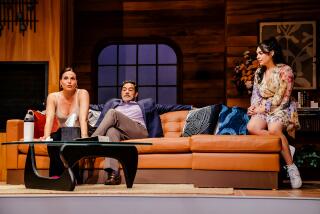STAGE REVIEW : ‘THE DINING ROOM’ PLAYS AT CYPRESS
Anyone who anxiously recalls the all-hands-on-the-table decorum of holiday meals or a fatherly reprimand once the breakfast dishes had been pushed away will probably identify with much of A.R. Gurney Jr.’s “The Dining Room” at Cypress College.
In Gurney’s introspective play, the dining room, with its polished wood tables and glittering silverware, is a symbol for civilized society--a refined niche where manners are proof of style and substance, and where mundane but important matters are hashed out. Of course, Gurney wants us to consider the traditional anchors of the home that are slipping adrift as life styles change and the nuclear family dissolves.
The drama, composed of several vignettes that occur in one stately dining room, presents parents who set down the law to disorderly children, grandmothers who wander in and out of senility, illicit lovers who agonize over indiscretions, youngsters who cartwheel through a birthday party and a father who discusses his funeral plans with a favorite son. And this last scene is probably the production’s best. It is touchingly acted, and it underscores Gurney’s basic theme beautifully: Could you talk of death as easily in the living room with the television staring back? No, says Gurney--the dining room, with its rituals and ceremonies, is the right place.
Cypress’ production, although flawed, is serviceable. Because of its symbolic nature, the play can seem a bit turgid, even maudlin at times, problems that director Nan Harris addresses. She brings a quick, clean pacing to the many overlapping scenes, which, also to her credit, are reasonably coherent. The play is complex, with various characters (some of the 12 actors shoulder as many as five roles) and abrupt shifts in time and tone, and it can be difficult to track.
The roles also pose some pitfalls that many of the actors fail to avoid. Since the characters are on and off the stage quickly, the portrayals must be precise, yet be fleshed-out and evocative enough to sustain interest. Unfortunately, many here substitute histrionics or one-note superficiality for telling character development.
Among the exceptions is Chip Boyd, who is confident, dignified and appealing as the father: His stewardship of the funeral arrangement scene is especially affecting in describing the love between and expectations of a dad and his boy.
Set designer Gene Putnam’s dining room is elegant and spacious enough to handle all the action. With the requisite immense maple table, an army of rigid, uncomfortable-looking chairs and a shimmering chandelier, it sets the mood. Still, there’s something missing. Where are the heirlooms and other dusty treasures that speak of a family’s history? Any proper dining room would be decked with such signposts to the past.
“The Dining Room” continues through Saturday at Cypress College’s Studio Theater at 9200 Valley View Ave., Cypress. Information: (714) 821-6320.
More to Read
The biggest entertainment stories
Get our big stories about Hollywood, film, television, music, arts, culture and more right in your inbox as soon as they publish.
You may occasionally receive promotional content from the Los Angeles Times.










